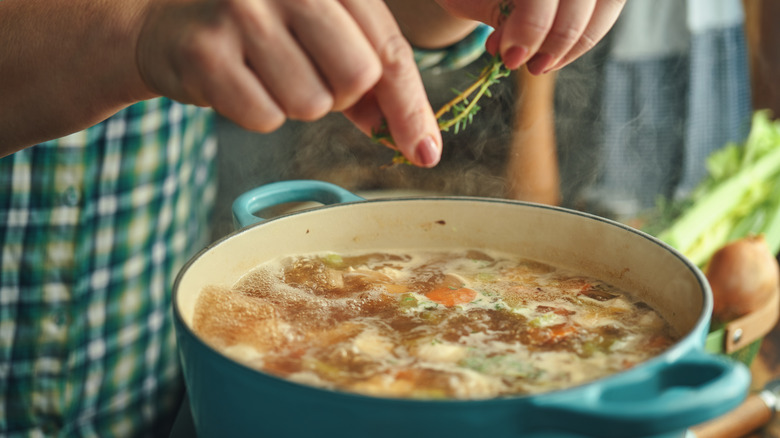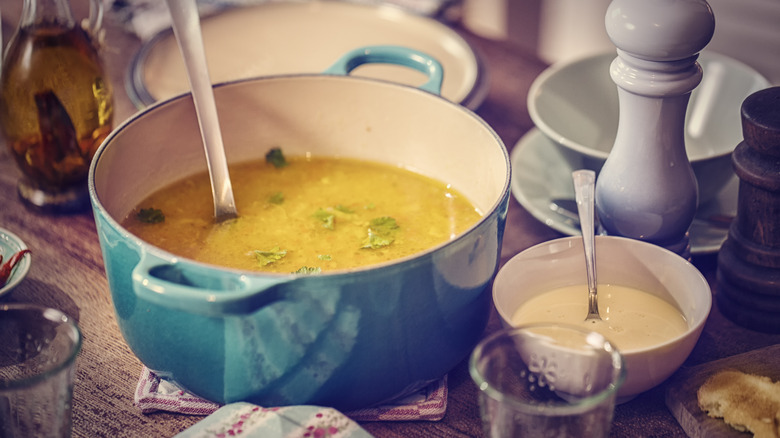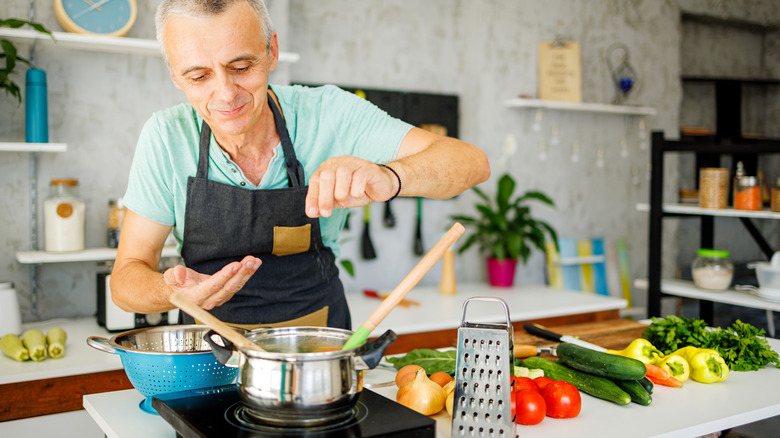Why It Matters When You Season Soup
Watch any professional chef in the kitchen and you'll see them repeatedly taste their food as they cook. "Taste your food" is a common cooking mantra, a reminder to always ensure you've properly seasoned your food. Remember this rule when making soup at home to avoid underseasoning or overseasoning your dish. It's also crucial to taste and season it at the right time in the cooking process. To avoid unpleasant, lip-puckering soup, taste it right before serving to see if it needs more salt or not.
When making a delicious homemade soup, it's important to keep in mind that broth and canned ingredients commonly used may already contain a high amount of sodium. Canned tomatoes and beans are often packaged with a significant amount of salt as a preservative. While any chef will tell you that properly salting your food is crucial, too much salt can easily ruin your soup — or any dish for that matter. Taste and adjust the seasoning at the end of cooking so you can properly gauge the saltiness of all the ingredients combined.
Easily achieve perfectly seasoned soup
If you've tasted your soup at the end of cooking and it tastes bland, adding salt and other seasonings like ground pepper and fresh herbs will boost the flavor tremendously. If using a full sodium broth and other salty ingredients, you may find that it doesn't require more salt but could still benefit from the acidity of lemon juice, yogurt, or sour cream which balances out the saltiness of broth. Lemon juice is one of the secret ingredients celebrity chefs use to perfect soup, so it must be effective, right?
While it's recommended to season your soup before serving it, that doesn't mean you can't season your chicken or carrots, onion, and celery as they sautée when making, for instance, a comforting homestyle chicken noodle soup. Adding salt to your protein and vegetables (which should be browned in the pot before adding the broth) will enhance their flavor as they cook in butter or oil.
While it's perfectly fine to taste the soup throughout the cooking process, once your ingredients are all combined and have cooked properly, make sure to taste the soup a final time before seasoning the broth. It also doesn't hurt to inform family and friends you're serving that you've already seasoned the soup, to avoid them accidentally ruining a perfectly good dish by adding more salt and pepper.
Other ways to avoid overly salty soup
You can prevent your soup from becoming too salty by following a few helpful tips. For one, use a sodium-free or low-sodium broth to better control the amount of salt you add to your soup. Starting with neutral broth gives you more room to add your preferred amount of salt and other seasonings. Additionally, reducing your soup is useful for intensifying the flavor, but it can also enhance the saltiness. Therefore, keep your soup simmering below a boil, covered or partially covered so it doesn't over-reduce.
It's easy to add more salt to underseasoned soup, but is it possible to fix overseasoned soup? Yes, you can save your over-salted or overseasoned soup by adding more water or plain broth. You can also tame the saltiness by incorporating dairy like milk, cream, or yogurt in your soup.
Did you know you can fix overly salty soup with one simple potato hack? If you're worried your soup will get too watery by adding more liquid, instead add a couple of unseasoned potatoes which will soak up some of the salt like a starchy sponge. Other starchy vegetables like carrots and parsnips also work to remedy overly salty soup.


